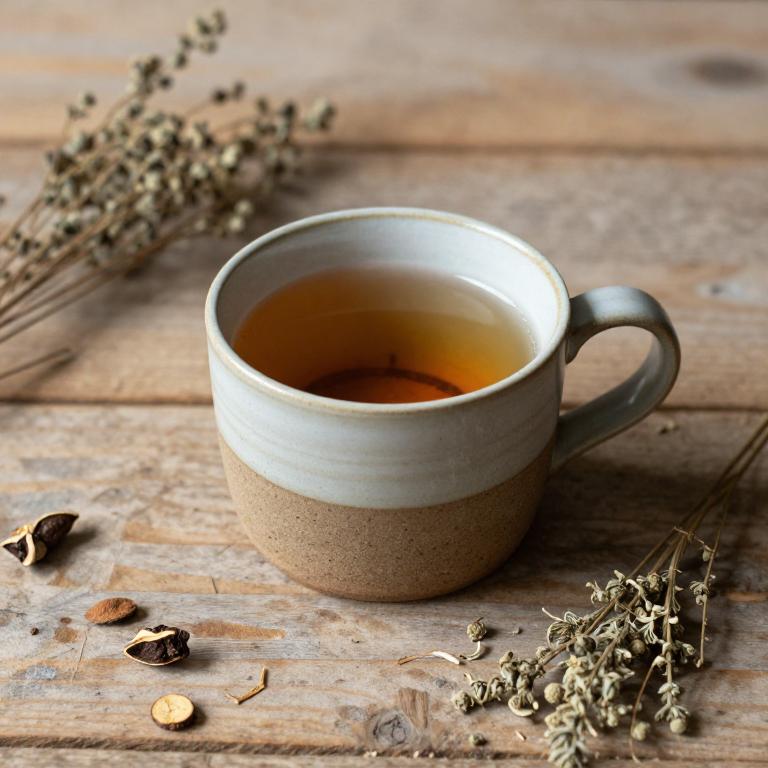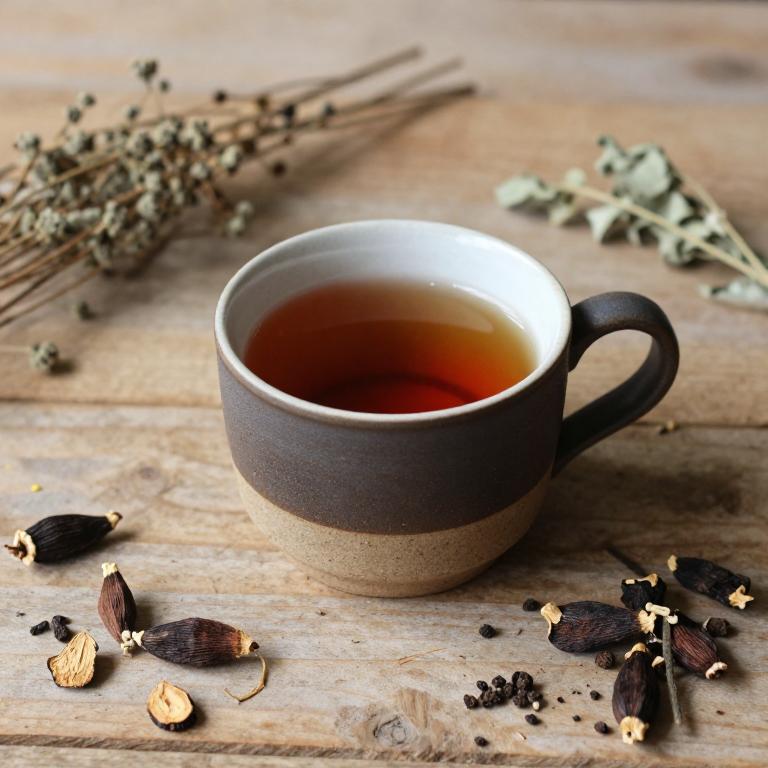10 Best Herbal Teas For Bad Breath

Herbal teas can be an effective natural remedy for bad breath due to their antimicrobial and cleansing properties.
Ingredients like peppermint, ginger, and licorice root are commonly used in herbal teas to freshen the mouth and reduce odor-causing bacteria. These teas work by stimulating saliva production, which helps neutralize acids and wash away food particles that contribute to bad breath. Additionally, some herbal teas contain antioxidants that promote oral health and reduce inflammation in the gums.
Incorporating herbal teas into a daily routine can be a gentle and pleasant way to maintain fresh breath without relying on artificial products.
Table of Contents
- 1. Salvia (Salvia officinalis)
- 2. Peppermint (Mentha piperita)
- 3. Rosemary (Rosmarinus officinalis)
- 4. Licorice (Glycyrrhiza glabra)
- 5. Fennel (Foeniculum vulgare)
- 6. Ceylon cinnamon (Cinnamomum verum)
- 7. Black pepper (Piper nigrum)
- 8. Eucalyptus (Eucalyptus globulus)
- 9. Cumin (Cuminum cyminum)
- 10. Turmeric (Curcuma longa)
1. Salvia (Salvia officinalis)

Salvia officinalis, commonly known as sage, has been traditionally used for its medicinal properties, including its ability to combat bad breath.
Sage herbal tea is made by steeping the dried leaves of the plant in hot water, releasing its natural antimicrobial compounds. These compounds help reduce oral bacteria that contribute to unpleasant breath, making sage tea a natural remedy for freshening the breath. Regular consumption of sage tea may also support overall oral health by reducing plaque and promoting a cleaner mouth environment.
Due to its effectiveness and mild flavor, sage herbal tea is a popular choice for those seeking a natural solution to bad breath.
2. Peppermint (Mentha piperita)

Mentha piperita, commonly known as peppermint, is a popular herb used in herbal teas to help alleviate bad breath.
The essential oils in peppermint, particularly menthol, have antimicrobial properties that can help reduce the bacteria responsible for causing halitosis. Peppermint tea is also refreshing and can help stimulate saliva production, which naturally cleanses the mouth. Regular consumption of peppermint herbal tea may contribute to improved oral hygiene and a fresher breath.
However, it is best used as a complementary remedy alongside proper dental care and a balanced diet.
3. Rosemary (Rosmarinus officinalis)

Rosmarinus officinalis, commonly known as rosemary, is a popular herb used in herbal teas to combat bad breath due to its natural antimicrobial properties.
The essential oils in rosemary, particularly cineole and camphor, help neutralize oral bacteria that contribute to unpleasant odors. Drinking rosemary tea can freshen the mouth and promote saliva production, which further aids in reducing bacteria and improving breath. It is often combined with other herbs like peppermint or thyme to enhance its freshening effects.
Regular consumption of rosemary herbal tea can be a natural and effective way to support oral health and maintain fresh breath.
4. Licorice (Glycyrrhiza glabra)

Glycyrrhiza glabra, commonly known as licorice root, is a popular herbal remedy used in teas to help alleviate bad breath.
This herb contains natural compounds like glycyrrhizin and flavonoids, which have antimicrobial and anti-inflammatory properties that can reduce oral bacteria responsible for odor. When brewed into a tea, licorice root can help neutralize acidic buildup in the mouth and promote a fresh, clean taste. Its soothing effects also support overall oral health by reducing inflammation in the gums and throat.
Regular consumption of licorice root tea may contribute to long-term improvements in breath freshness and digestive wellness.
5. Fennel (Foeniculum vulgare)

Foeniculum vulgare, commonly known as fennel, is a popular herb used in herbal teas to help alleviate bad breath.
The essential oils in fennel, particularly anethol, have natural antibacterial properties that can help reduce oral bacteria responsible for unpleasant odors. Fennel tea is often consumed after meals or as a bedtime remedy to freshen the breath and promote digestive health. Its mild, sweet aroma makes it a pleasant and soothing option for those seeking natural oral care.
Regular consumption of fennel tea may support overall oral hygiene and contribute to long-term breath freshness.
6. Ceylon cinnamon (Cinnamomum verum)

Cinnamomum verum, commonly known as true cinnamon, is widely used in herbal teas for its natural ability to combat bad breath.
The essential oils in cinnamon, particularly cinnamaldehyde, possess antimicrobial properties that help reduce the bacteria responsible for oral odor. When brewed into a tea, cinnamon can freshen the mouth and neutralize unpleasant smells by inhibiting the growth of odor-causing microorganisms. It is often combined with other herbs like ginger or peppermint to enhance its digestive and freshening effects.
Regular consumption of cinnamon herbal tea may contribute to overall oral hygiene and help maintain fresh breath throughout the day.
7. Black pepper (Piper nigrum)

Piper nigrum, commonly known as black pepper, is a popular herb used in herbal teas to address bad breath due to its antimicrobial and digestive properties.
The essential oils in black pepper, such as piperylene and myrcene, help neutralize oral bacteria that contribute to unpleasant odors. Drinking black pepper tea can stimulate saliva production, which naturally cleanses the mouth and reduces the buildup of odor-causing compounds. Additionally, its warming properties aid in improving digestion, preventing post-meal bad breath.
While it can be a useful complementary remedy, it is advisable to consult a healthcare professional for persistent or severe cases of bad breath.
8. Eucalyptus (Eucalyptus globulus)

Eucalyptus globulus, commonly known as the Australian eucalyptus, is often used in herbal teas to help combat bad breath due to its natural antimicrobial properties.
The essential oils in eucalyptus globulus contain compounds like eucalyptol, which can help reduce the bacteria that cause oral malodor. Drinking eucalyptus globulus tea may help freshen the mouth and promote a cleaner breath by neutralizing odor-causing agents. However, it is important to note that while it may offer some temporary relief, it should not replace proper oral hygiene practices.
As with any herbal remedy, it is advisable to consult a healthcare professional before regular use, especially for individuals with allergies or existing health conditions.
9. Cumin (Cuminum cyminum)

Cuminum cyminum, commonly known as cumin, is a popular herb used in herbal teas to help combat bad breath due to its natural antimicrobial properties.
The essential oils in cumin, such as limonene and cineole, help neutralize oral bacteria that cause odor. Drinking cumin tea can freshen the mouth and reduce the presence of sulfur compounds responsible for unpleasant breath. It is often combined with other herbs like mint or ginger to enhance its digestive and breath-freshening effects.
Regular consumption of cumin herbal tea may support overall oral health and contribute to long-term breath improvement.
10. Turmeric (Curcuma longa)

Curcuma longa, commonly known as turmeric, is widely used in herbal teas to address bad breath due to its potent antimicrobial and anti-inflammatory properties.
The active compound curcumin in turmeric helps neutralize odor-causing bacteria in the mouth, promoting fresher breath. Regular consumption of turmeric tea can support overall oral health by reducing plaque and preventing gum inflammation. It is often combined with other herbs like ginger or cinnamon to enhance its flavor and effectiveness.
However, it is advisable to consult a healthcare professional before incorporating turmeric into your routine, especially if you have existing health conditions or are on medication.